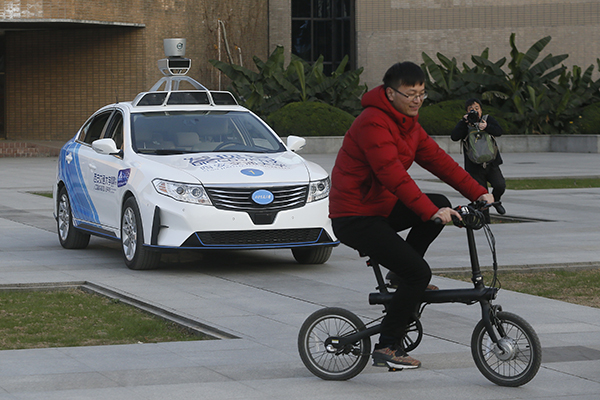China completes first draft of national rules to allow road tests for driverless vehicles
Sign up now: Get insights on Asia's fast-moving developments

A self-driving car demonstrates how it can steer clear of a cyclist in Xi'an, capital of Shaanxi province, in December 2017.
PHOTO: THE CHINA DAILY/ ASIA NEWS NETWORK
Follow topic:
BEIJING (CHINA DAILY/ASIA NEWS NETWORK)- China has completed the first draft of nationwide regulations to allow the road tests of self-driving vehicles on public roads across the country.
This development is part of a broader push for China to gain a lead in commercialising such vehicles, according to a source close to the matter.
"The first draft has already been reviewed by experts from the Ministry of Transport, the Ministry of Public Security and other institutions, which will play an important part in ensuring safe road tests of such vehicles," said Mr Gong Zheng, an engineer at the China Academy of Information and Communications Technology, a think-tank affiliated with the Ministry of Industry and Information Technology.
Apart from detailing the testing requirements for drivers, cars and companies, the regulations will also identify road sections which are suitable for such tests and how they should be reconstructed to offer a better testing environment for autonomous vehicles, Gong told China Daily.
According to him, the regulations are likely to be unveiled this year, but no firm timetable has been drawn up.
China has identified autonomous cars as one of the key sectors in its "Made in China 2025" programme to transform the country into a world leader in innovation, but the country remains in the slow lane for road-testing driverless vehicles because existing laws do not allow such vehicles on the roads.
In July last year, Baidu Inc. CEO Robin Li raised eyebrows when he tested an autonomous vehicle on Beijing's Fifth Ring Road with his hands off the wheel.
The stunt caught the attention of city authorities, who subsequently threatened to investigate, reported Caixin news website.
Last month (Dec 2017), Beijing became the first Chinese city to allow road tests of autonomous vehicles. Beijing's guideline on autonomous driving is the first document of its kind in the country.
It allows independent entities registered in China to test at most five vehicles at any one time. The entities have to first complete tests in designated closed zones before conducting tests on the roads, according to the guideline.
China's first road section for such tests will be in Yizhuang, a town in Beijing's Daxing district, according to Zou Ying, a researcher at the technology department with Beijing Municipal Commission of Transport.
"Ride facilities, such as traffic signals, signs and lane markings, will be reconstructed, so that they can be identifiable for self-driving vehicles," he told China Daily.
John Zeng, managing director of the consulting firm LMC Automotive Shanghai, said a nationwide guideline for such tests would lower the costs involved for automotive companies as they would not need to repeat self-driving tests in multiple cities with different sets of regulations.
"It shows the central government realises that unified standards are key to accelerating the development of autonomous vehicles, and it will also help to avoid the missteps made in promoting new-energy vehicles," Zeng added.
China expects intelligent cars with partial or fully autonomous functions to account for one in two new vehicles sold in the country by 2020, according to the National Development and Reform Commission.
Faced with regulatory hurdles at home, Chinese companies have headed to California to conduct road tests for driverless vehicles. Nearly one-third of the more than 30 firms seeking permission to conduct such tests are from China, according to data released by the California Department of Motor Vehicles.
But experts point out that traffic situations in the United States and China differ considerably, and a test on Chinese roads is crucial in ensuring what they describe as "fully localised smart transportation solutions".
During an annual conference held by Chinese internet giant Baidu in November, the company's CEO Robin Li said mass production of autonomous vehicles built using its Apollo platform will begin in 2018

